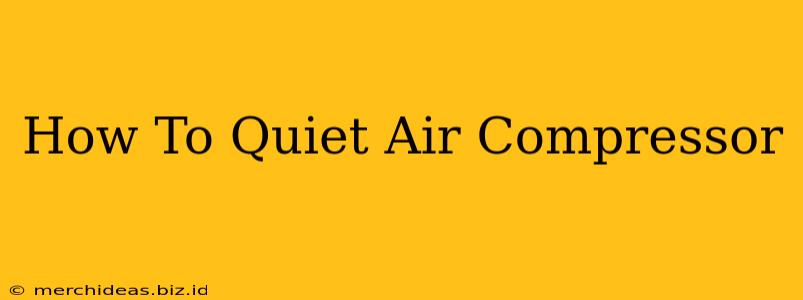A noisy air compressor can be a real headache, disrupting your work and annoying your neighbors. Fortunately, there are several ways to significantly reduce the noise levels of your air compressor, transforming it from a bothersome machine to a more tolerable tool. This guide explores various methods to quiet your air compressor, from simple DIY solutions to more involved modifications.
Understanding Air Compressor Noise
Before diving into solutions, it's crucial to understand the sources of air compressor noise. Typically, noise comes from two main sources:
- Mechanical Noise: This is the sound generated by the motor, the pump's internal components, and vibrations transmitted through the compressor's frame. This type of noise is often a low-frequency rumble.
- Air Noise: This is the sound of compressed air escaping the system, including hissing from leaks and the high-pressure discharge. This noise is often a higher-pitched whine or whistle.
Methods to Quiet Your Air Compressor
Addressing both mechanical and air noise is key to effective sound reduction. Here are several strategies you can employ:
1. Acoustic Enclosure/Soundproofing Box
Building or purchasing a soundproof enclosure is one of the most effective ways to dramatically reduce noise. These enclosures are designed to absorb and block sound waves. Consider these factors when choosing or building an enclosure:
- Material: Sound-absorbing materials like acoustic foam, mass-loaded vinyl, and mineral wool are ideal.
- Size: The enclosure needs to be large enough to accommodate your compressor and allow for adequate air circulation.
- Ventilation: Proper ventilation is crucial to prevent overheating.
DIY Tip: You can build a basic enclosure using plywood, acoustic foam, and weather stripping. Remember to leave adequate space for ventilation.
2. Vibration Isolation
Vibrations are a major contributor to air compressor noise. Isolating your compressor from its surroundings can significantly reduce noise transmission:
- Vibration Pads/Mounts: Place your compressor on vibration dampening pads or mounts made of rubber or neoprene. These absorb vibrations before they can travel through the floor or ground.
- Concrete Slab: Installing your compressor on a separate concrete slab can further minimize vibration transmission.
Pro Tip: Consider the weight of your compressor when selecting vibration isolation materials; you'll need mounts that can adequately support its weight.
3. Addressing Air Leaks
Leaks contribute to high-pitched noise. Regularly inspect your air compressor for leaks and repair them promptly using appropriate sealant or replacement parts. Pay close attention to:
- Hoses and Fittings: Check for cracks, loose connections, or worn-out seals.
- Pressure Relief Valves: Ensure these are functioning correctly and not leaking air.
Maintenance Tip: Regular maintenance, including lubrication and cleaning, helps prevent leaks and keeps your compressor running efficiently and quietly.
4. Mufflers and Silencers
Consider adding mufflers or silencers to the air intake and/or discharge ports. These devices reduce the noise of the compressed air escaping the system. These are often available as aftermarket accessories.
Important Note: Always ensure that any added silencers or mufflers are compatible with your specific air compressor model.
5. Location, Location, Location
Strategic placement of your air compressor can also make a difference:
- Distance: Place it as far away as possible from your home, work area, or sensitive areas.
- Barriers: Use natural barriers like fences or landscaping to help block noise.
6. Compressor Selection
If you're in the market for a new air compressor, consider models that are specifically designed to be quieter. Look for features like:
- Oil-lubricated pumps: These tend to be quieter than oil-free pumps.
- Reduced RPM motors: Lower RPM motors generally produce less noise.
- Sound-dampening features: Some manufacturers incorporate sound-dampening materials into their compressor designs.
By implementing these strategies, you can significantly reduce the noise produced by your air compressor, creating a more peaceful and productive work environment. Remember to always prioritize safety when working with tools and machinery.
